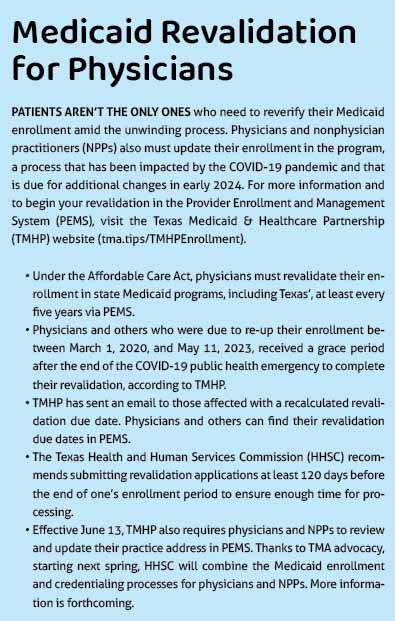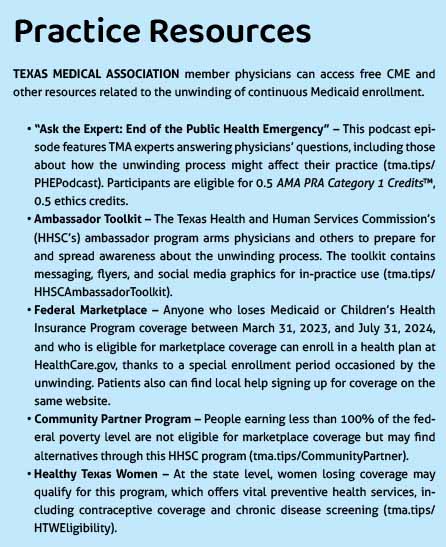
Since April, San Juan pediatrician Roel Cantu, MD, and his practice manager have had to give their young patients and families constant reminders – not just to take their medicines and get their regular shots as one might expect.
Rather, they’re having to remind the parents of those patients – roughly 90% of whom are enrolled in Medicaid or the Children’s Health Insurance Program (CHIP) – to verify their eligibility for the program, fill out the paperwork, and make sure they don’t lose coverage.
The end of the COVID-19 public health emergency (PHE) on May 11 had already set in motion the end of continuous Medicaid eligibility, made possible by federal pandemic relief legislation that relaxed requirements for patients to regularly show that they qualify for the program. Since April, Texas, like other states, has been “unwinding” this pandemic perk by reverifying the eligibility of not only those who directly benefited from the enhanced coverage but also all other Medicaid enrollees – nearly 6 million people.
Dr. Cantu, a member of the Texas Medical Association’s Council on Socioeconomics, says many of his patients’ parents assume their children will remain covered without any action on their part, as was true during the three-year PHE. Those already disenrolled arrive for an appointment surprised to learn they’ll have to pay out of pocket. Many have walked out because they can’t afford the cost, leaving their children with a gap in medical care and Dr. Cantu’s practice without a major revenue stream.
“From a pediatric point of view and seeing Medicaid patients, it’s tough,” said Dr. Cantu, who already works a second job and struggles to keep his practice open since the onset of the COVID-19 pandemic.
For months, TMA has sounded the alarm about this process, including its potential to cause a coverage cliff that would be harmful to Medicaid patients and the physicians who care for them.
Recent data confirm these fears – and then some. (See “Unwinding the Numbers,” page 30.)
As of Sept. 26, 74% of the approximately 888,300 Texans unwound so far potentially remain eligible but have lost coverage because of various procedural reasons. These reasons include technical barriers, such as an inability to upload or download required documentation; inaccurate instructions; and not receiving information because of address changes.
Among the states with available data, Texas leads in the number of residents disenrolled. But many still will qualify for Medicaid, CHIP, or other alternatives, so TMA and state officials continue to urge physicians to talk to their patients.

Sheila Magoon, MD, a family physician in Harlingen and member of TMA’s Committee on Medicaid, CHIP, and the Uninsured, says there are steps physicians can take to mitigate the unnecessary loss of coverage.
“I was gravely concerned about what this impact would be because we have such a big Medicaid population,” the executive director of the South Texas Physicians Alliance said.
She spearheaded an unwinding awareness campaign, directing regional physicians to TMA webinars and sharing the state’s Ambassador Toolkit, which contains messaging, flyers, and social media graphics for in-practice use. (See “Practice Resources,” page 28.)
So far, Dr. Magoon says this approach seems to be working, and it may be a good template for other practices.

Pulling the thread
Nevertheless, Texas physicians who care for Medicaid patients say the unwinding threatens access to care, adds to practice workloads, and warrants reconsideration by federal officials.
The Texas Health and Human Services Commission (HHSC) has a three-phase plan for redetermining Medicaid eligibility. As it plays out, many enrollees will lose coverage because they no longer qualify, as intended. But state data show the vast majority of disenrollees have lost coverage instead because of bureaucratic barriers.
Helen Kent Davis, TMA’s associate vice president of governmental affairs, said this mass loss of coverage “will impact patient care and practice viability and [will] stress the state’s safety net” after three years of pandemic pressures.
She added that TMA is working closely with HHSC to consider interventions that might reduce the share of disenrollments that occur because of red tape. For instance, as of Sept. 26, only 2.4% of all Texas Medicaid reenrollments were conducted on an “ex parte” basis, meaning their eligibility had been verified through existing sources, such as state wage databases, rather than by sending a form to or requesting documentation from the enrollee.
Texas lags behind nearly every other state with available data, but it is not alone in its unwinding troubles. The overall rate of procedural disenrollment remains high.
Given such challenges, the Centers for Medicare & Medicaid Services (CMS) in August sent a letter to every state’s Medicaid director, including Texas’, urging them to pursue federal flexibilities to minimize coverage losses for procedural reasons. CMS also directed states to improve ex parte renewals after finding states to be noncompliant with federal standards.
Still, many Texas physicians, including Austin-area pediatricians Maria Scranton, MD, and Louis Appel, MD, say patients and their families are struggling to navigate the unwinding.
“It’s been kind of a nightmare,” said Dr. Scranton, who chairs TMA’s Committee on Medicaid, CHIP, and the Uninsured.
She has heard from patients who say they haven’t received any communication from HHSC regarding the process. After other patients received bills for care they thought was covered by Medicaid, she worked with their Medicaid managed care organization to ascertain why they had been disenrolled and to reenroll those who remained eligible. Her practice staff also confirm patients’ Medicaid status ahead of appointments, which takes time and often leads to delays.
“This takes a lot of people power,” she said.
As a result, the unwinding is costing practices and undercutting gains in other areas, such as the hard-won Medicaid physician rate increases that took effect on Sept. 1 after years of advocacy by TMA. (See “First Steps,” page 14.)
Dr. Appel worries about the share of children dropped so far, another statistic in which Texas leads. Disenrollments for this group largely were scheduled to begin no sooner than Nov. 8. But state data show children accounted for 81% of disenrollments in Texas as of Sept. 26, leaving him anxious about a possible uptick in the coming months.
And there are other ripple effects, says Dr. Appel, immediate past president of the Texas Pediatric Society and director of pediatrics at People’s Community Clinic, where the majority of pediatric patients are on Medicaid.
“When children lose their Medicaid, if they have conditions that require ongoing medication treatment or therapies or specialty care, then there’s a burden on the [clinician] to revise the treatment plan,” he said.
Such revisions could include new medications that are more affordable but also perhaps less effective or convenient. A primary care physician also might assume a greater level of care until the patient’s coverage – and access to specialists – is restored.
“It definitely requires more time and energy on the part of the health care team and is also a big burden and stress for the family,” he said.

Other interventions
In response to preliminary data and concerns like these, TMA experts, state officials, and federal agencies have made additional moves to improve the process.
CMS recently paused disenrollments in 12 states – so far unnamed – to resolve issues related to compliance with renewal requirements, according to news reports.
After receiving letters of concern from Democratic U.S. House members and anonymous whistleblowers at HHSC, federal health officials also worked with HHSC “to restore tens of thousands of people to [Texas’] Medicaid rolls who had lost coverage erroneously,” Bloomberg Law reported in late August (tma.tips/BloombergUnwinding).
Meanwhile, TMA joined 15 other organizations, among them the Texas Pediatric Society, asking HHSC to adopt more strategies to minimize procedural disenrollments, including doubling the period in which enrollees can respond to notices, from 30 days to 60 days.
Texas agreed to do so, but only for the third and final cohort, which comprises those likely to remain eligible for Medicaid, primarily children, older adults, and people with disabilities. HHSC sent out notices to the third cohort on Sept. 9 and will notify Medicaid managed care organizations of enrollees who don’t respond by the deadline so they can conduct additional outreach.
In addition, two recent webinars hosted by TMA provided information about alternative coverage options via state programs, the federal marketplace, or employer-based coverage. (See “Practice Resources,” page 28.)
Ms. Kent Davis adds that postpartum women, in particular, may need to seek other coverage because implementation of House Bill 12 by Rep. Toni Rose (D-Dallas) – which passed in 2023 to extend postpartum Medicaid coverage from two months to one year – will not coincide with the unwinding process. (See “On the Mend,” page 20.)
At the state level, women losing coverage may qualify for the Healthy Texas Women (HTW) program. But the coverage is not comprehensive, meaning marketplace coverage might be a better option for women who qualify for that.
Ms. Kent Davis also warns “it’s not necessarily a seamless handoff between Medicaid and the exchange,” underscoring the importance of navigators and physician awareness.
Fortunately, some recent policy developments have increased federal funding for navigators – community organizations that connect eligible consumers to federal marketplace health plans – and extended subsidies for the same plans.
Certain patients who lose Medicaid or CHIP coverage may qualify for marketplace coverage.
People earning less than 100% of the federal poverty level are not eligible for marketplace coverage but may find alternatives through HTW, community-based programs, or HHSC’s Community Partner Program.
Ms. Kent Davis also notes the unwinding’s impact extends beyond Medicaid reenrollment, slowing the processing of new Medicaid applications. Roughly 25% of such applications exceed required processing times, according to HHSC.
